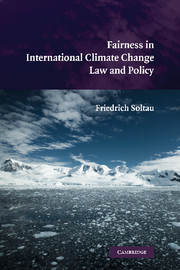Book contents
- Frontmatter
- Contents
- List of Abbreviations and Acronyms
- Acknowledgments
- 1 Fairness in International Climate Law and Policy
- 2 The Science of Climate Change and the Energy Challenge
- 3 Development of the International Climate Change Regime
- 4 Theoretical Aspects of Fairness
- 5 Fairness in the Climate Change Regime
- 6 Evaluation of Proposals for Future Climate Policy
- 7 Conclusion
- Bibliography
- Index
- References
1 - Fairness in International Climate Law and Policy
Published online by Cambridge University Press: 24 December 2009
- Frontmatter
- Contents
- List of Abbreviations and Acronyms
- Acknowledgments
- 1 Fairness in International Climate Law and Policy
- 2 The Science of Climate Change and the Energy Challenge
- 3 Development of the International Climate Change Regime
- 4 Theoretical Aspects of Fairness
- 5 Fairness in the Climate Change Regime
- 6 Evaluation of Proposals for Future Climate Policy
- 7 Conclusion
- Bibliography
- Index
- References
Summary
Those of us who live on small specks of land,…in the Caribbean, have not agreed to be sacrificial lambs on the altar of success of industrial civilization.
The economy is a wholly owned subsidiary of the environment.
Science is about truth and should be wholly indifferent to fairness or political expediency.
INTRODUCTION
Climate change is forcing decision makers at national and international levels to make difficult choices. Confronted with competing demands and interests, countries are faced with committing significant resources to avoid consequences that, while beginning to be felt now, will only manifest themselves decades and, in some cases, centuries from now. Decisions will need to be taken under conditions of considerable uncertainty as to the exact scope and timing of harm. Moreover, the adverse impacts of climate change will be unevenly distributed, with the countries least responsible for the historical buildup of greenhouse gases (GHGs) bearing the brunt. Under such conditions, values and principles carry added weight in decision making. Science provides information on the status of the climate system and projections of future changes. Economics attempts to present the costs and benefits of alternative courses of action. Yet observing the global effort to combat climate change reveals that a key part of the discussion revolves around the contested concept of fairness. A juridical analysis of options to combat climate change will benefit from a critical engagement with the principle of fairness.
Fairness claims and discourse are a major part of the climate change regime.
- Type
- Chapter
- Information
- Publisher: Cambridge University PressPrint publication year: 2009
References
- 1
- Cited by



